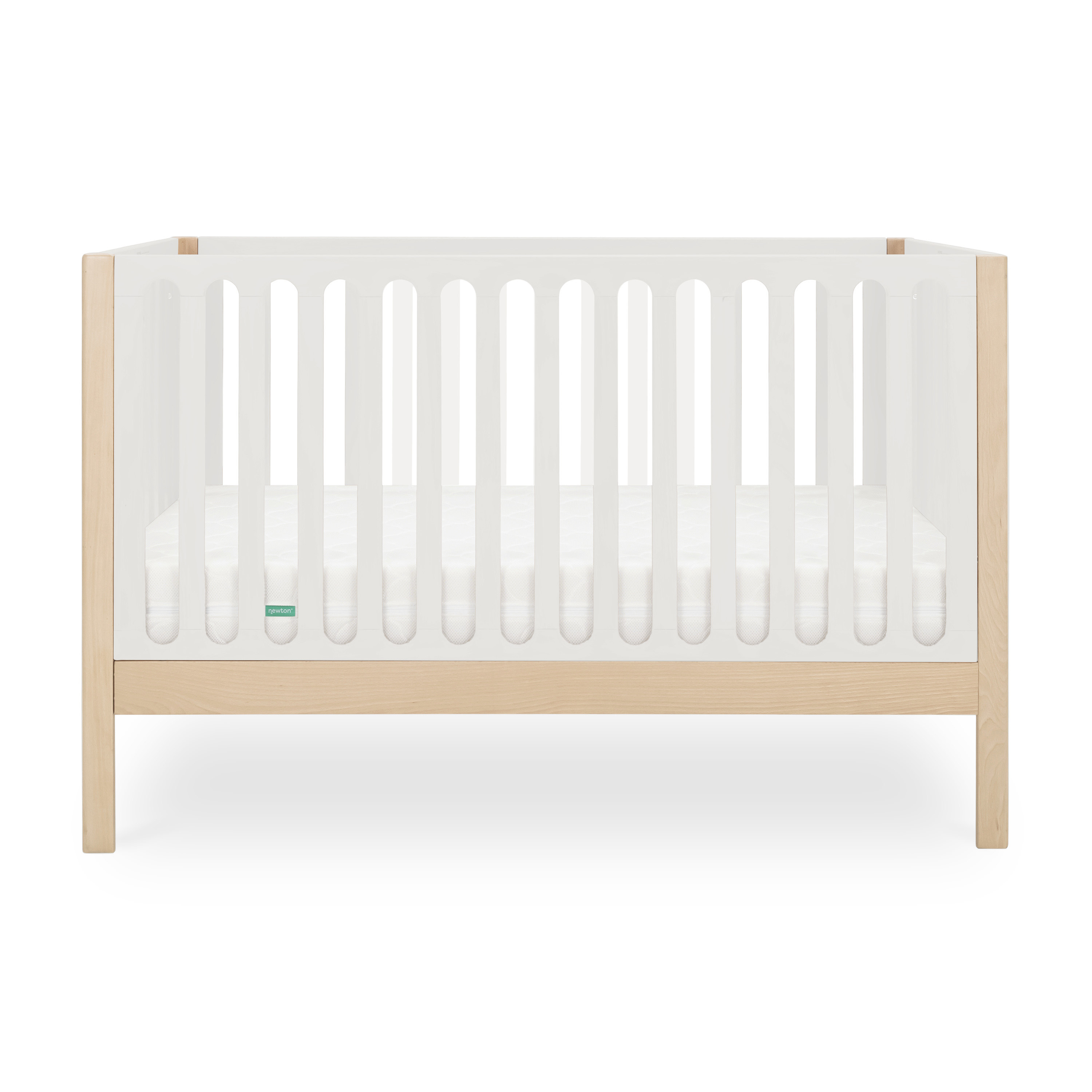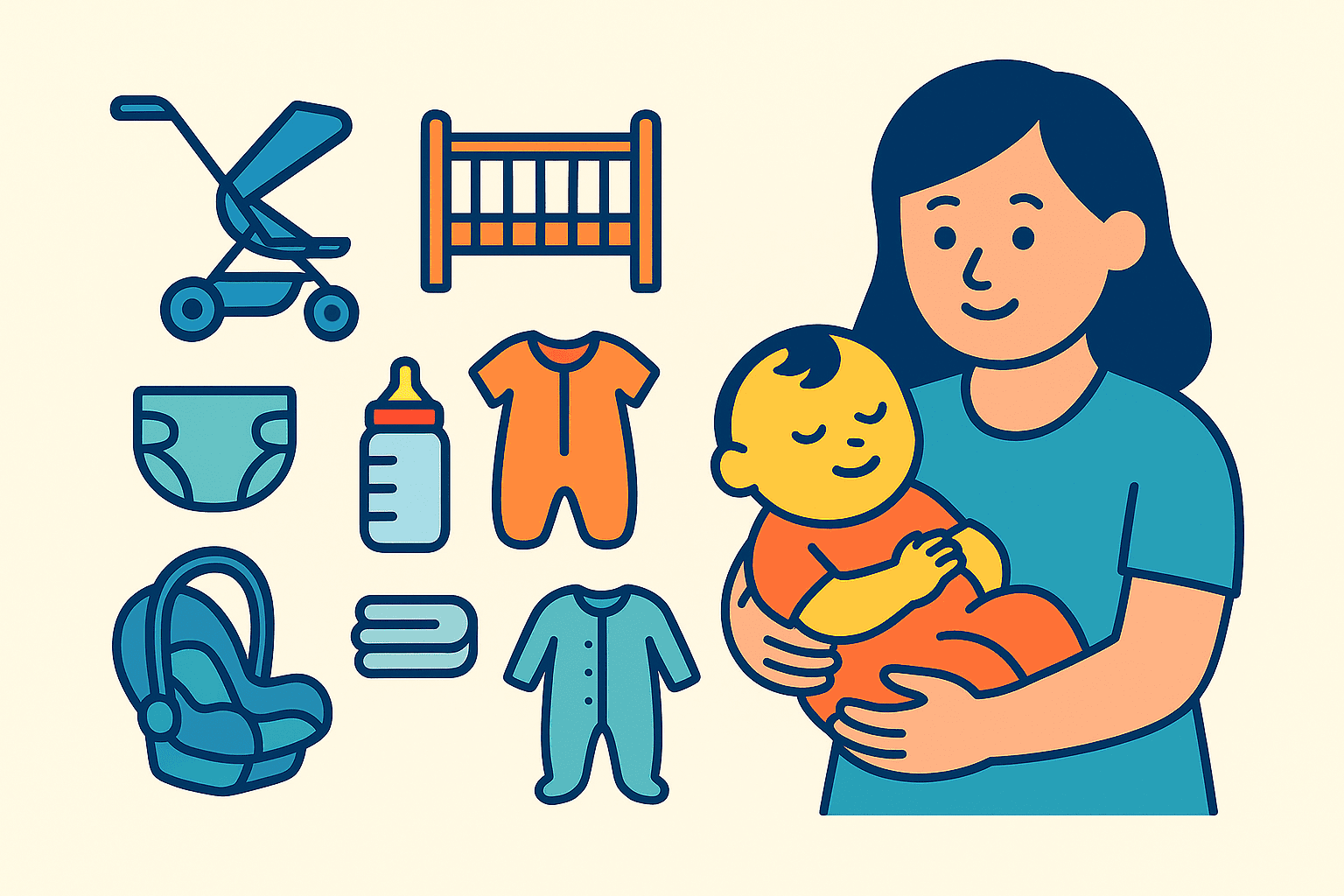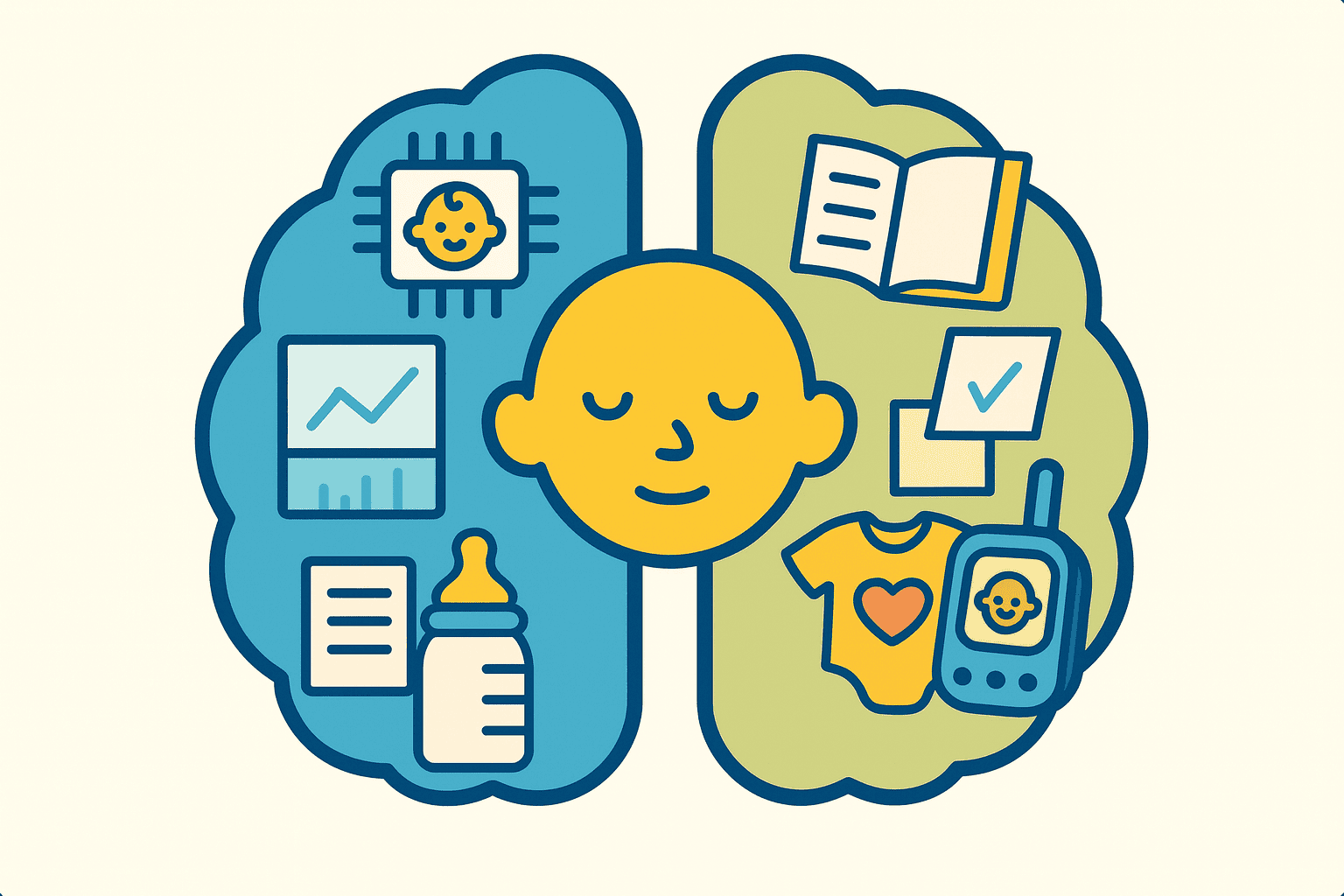*We're parents too. By buying products via our affiliate links we may earn a commission to support our growing family at no cost to you!
AI vs. Traditional baby registry Planning: Pros & Cons for 2025
Quick Answer
AI-powered registry tools offer personalized recommendations and time savings, while traditional planning provides personal connections and hands-on experience. Both approaches have unique benefits for different parenting styles and preferences.
In This Guide
- Comparison of AI vs traditional registry planning
- Pros and cons of each approach
- How to choose the right method for your family
- Tips for maximizing registry success
- Privacy and technology considerations
- Hybrid approaches and best practices
All Products in This Guide
Essential baby products that work well with both AI and traditional planning approaches
Our Recommendations
(8 products)







Create Your Registry
Amazon Baby Registry
*Subject to availability and Retailer's terms.
We earn commissions from these links.
baby registry planning has evolved dramatically with the rise of artificial intelligence. Today’s parents choose between AI-powered tools that analyze their preferences and traditional methods that rely on research and recommendations.
This guide compares both approaches to help you decide which method works best for your family. You’ll discover the benefits and limitations of each approach, plus practical tips for maximizing your registry success regardless of which method you choose.
Understanding the Two Approaches
Traditional baby registry Planning
Traditional planning relies on manual research, recommendations from friends and family, and personal preferences. This method involves:
- Manual research - Reading reviews, comparing products, checking safety ratings
- Personal recommendations - Advice from experienced parents and family members
- Store visits - Physically examining products before adding them to your registry
- Self-directed learning - Researching baby development stages and needs
- Manual organization - Keeping track of items across multiple platforms
AI-Powered baby registry Planning
AI tools use algorithms and machine learning to personalize recommendations based on your specific situation. Start your personalized registry with our smart recommendation engine that learns your preferences and suggests the perfect items for your family. These tools typically:
- Analyze your preferences - Consider your lifestyle, budget, and space constraints
- Provide personalized recommendations - Suggest products based on your unique needs and preferences
- Automate research - Compare products and prices across multiple retailers automatically
- Track registry completion - Monitor what’s been purchased and what’s still needed
- Offer smart suggestions - Recommend complementary items you might have missed through traditional research
AI-Powered Registry Planning: Pros and Cons
Pros of AI Registry Planning
Personalized Recommendations AI tools analyze your specific situation to provide tailored suggestions. Amazon’s baby registry and Target’s registry use AI to consider factors like your living space, budget, lifestyle, and preferences to recommend products that work for your family. For example, if you live in a small apartment, AI might suggest space-saving solutions like convertible furniture.
Time Savings AI automates much of the research process. Instead of spending hours comparing products, AI tools quickly analyze thousands of options and present the best matches for your needs.
Comprehensive Coverage AI tools often catch items you might miss through traditional research. Zola Baby and Babylist suggest complementary products and remind you of essentials you might overlook. For instance, if you add a stroller to your registry, AI might suggest a car seat adapter or weather protection accessories.
Price Optimization Many AI tools compare prices across multiple retailers and alert you to sales and discounts. This can save significant money on your registry purchases.
Continuous Learning AI tools improve their recommendations based on user feedback and changing trends. They stay current with the latest products and safety standards.
Cons of AI Registry Planning
Limited Personal Touch AI recommendations lack the personal experience and emotional connection that comes from recommendations from friends and family who know you well.
Potential for Overwhelm Some AI tools provide too many options, creating decision fatigue rather than simplifying the process.
Privacy Concerns AI tools collect and analyze personal data to provide recommendations. Some parents worry about how this information is used and stored.
Dependency on Technology Relying entirely on AI tools can make you less confident in your own decision-making abilities when it comes to parenting choices.
Quality vs. Quantity AI tools prioritize popular or highly-rated items over products that are truly a good fit for your specific situation.
Traditional Registry Planning: Pros and Cons
Pros of Traditional Planning
Personal Connection Traditional planning allows you to benefit from the wisdom and experience of people who know you and your family personally.
Hands-On Experience You physically examine products like the Newton Breathable 2-Stage Mattress, test them out, and get a real feel for how they work before making decisions.
Trusted Recommendations Recommendations from friends and family come with personal stories and experiences that help you understand how products like the HALO BassiNest Swivel Sleeper work in real life.
No Technology Dependence Traditional planning doesn’t require you to share personal data or rely on algorithms you don’t understand.
Flexibility You can mix and match from multiple sources, creating a truly customized registry that reflects your unique preferences and values, whether that includes the BabyBjorn Bouncer Bliss or the Guava Lotus Travel Crib.
Cons of Traditional Planning
Time Intensive Traditional planning requires significant time investment for research, comparison, and organization.
Limited Scope Personal recommendations are limited to what your network has experience with. You might miss excellent products your friends and family haven’t used.
Outdated Information Recommendations from friends and family may be based on products that are no longer available or have been updated with better options.
Bias and Preferences Personal recommendations reflect the preferences and experiences of the people giving them, which may not align with your needs.
Manual Organization Traditional planning requires you to manually track items across multiple retailers and platforms.
Hybrid Approach: Best of Both Worlds
Many modern parents find success by combining AI tools with traditional planning methods:
Use AI for Research and Discovery
- Product discovery - Let AI tools suggest products like the Aden + Anais Muslin Swaddle Blankets you might not find through traditional research
- Price comparison - Use AI to find the best deals across multiple retailers
- Completeness checking - Use AI to ensure you haven’t missed essential items like the Safety 1st Baby Healthcare Kit
Use Traditional Methods for Final Decisions
- Personal recommendations - Get input from friends and family on specific products like the Medela Symphony Breast Pump Kit
- Hands-on testing - Physically examine important items before adding them to your registry
- Trusted sources - Rely on personal experience for high-value items like car seats and cribs
Combine Both for Organization
- AI tools for initial organization and tracking
- Personal systems for final registry management
- Multiple platforms to take advantage of different features and benefits, including the Lansinoh Lanolin Nipple Cream for nursing comfort
Making the Right Choice for Your Family
Choose AI-Powered Planning If:
- You’re short on time and need efficient solutions
- You prefer data-driven recommendations
- You’re comfortable with technology and privacy trade-offs
- You want comprehensive coverage without extensive research
- You’re a first-time parent without a strong support network
Choose Traditional Planning If:
- You value personal connections and recommendations
- You prefer hands-on experience with products
- You have privacy concerns about data sharing
- You have a strong support network of experienced parents
- You enjoy the research and planning process
Choose a Hybrid Approach If:
- You want the efficiency of AI with the personal touch of traditional methods
- You’re comfortable with technology but value personal recommendations
- You have time to combine both approaches
- You want comprehensive coverage with trusted input
Tips for Success with Either Approach
For AI-Powered Planning
- Start early - Give the AI time to learn your preferences
- Provide detailed information - The more specific you are, the better the recommendations
- Review recommendations critically - Don’t accept every suggestion without consideration
- Combine multiple AI tools - Use different platforms to get varied perspectives
- Maintain personal oversight - Always review and approve items before adding them
For Traditional Planning
- Cast a wide net - Ask for recommendations from diverse sources
- Research thoroughly - Don’t rely solely on personal recommendations
- Stay organized - Use spreadsheets or apps to track your registry across platforms
- Consider your unique situation - Personal recommendations may not fit your specific needs
- Trust your instincts - You know your family best
For Hybrid Planning
- Use AI for discovery - Let technology suggest products you might miss
- Use traditional methods for validation - Get personal input on important decisions
- Stay organized - Keep track of which method led to which decisions
- Be flexible - Adjust your approach based on what works best for different categories
- Trust the process - The combination often provides the best results
Registry Planning Tools Comparison
AI-Powered Tools
- Smart Baby Checklist - Personalized recommendations based on your preferences
- Amazon Registry - AI-powered suggestions and price tracking
- Babylist - Comprehensive registry with smart recommendations
- Target Registry - AI-enhanced organization and completion tracking
Traditional Tools
- Spreadsheets - Manual organization and tracking
- Multiple retailer registries - Separate registries for different stores
- Personal research - Manual product comparison and review reading
- Word-of-mouth - Recommendations from friends and family
Frequently Asked Questions
Q:What are the main advantages of AI-powered registry planning?
A: AI-powered planning offers personalized recommendations, time efficiency, comprehensive coverage, and data-driven insights. It can analyze thousands of products and reviews to suggest items tailored to your specific needs and preferences.
Q:What are the benefits of traditional registry planning?
A: Traditional planning provides personal recommendations from trusted sources, hands-on product experience, privacy control, and emotional connection. It relies on real-world experience and personal relationships.
Q:Which approach is better for first-time parents?
A: A hybrid approach often works best for first-time parents. Use AI for discovery and comprehensive coverage, then validate important decisions with personal recommendations from experienced parents and trusted sources.
Q:How do I choose between AI and traditional methods?
A: Consider your time constraints, comfort with technology, privacy concerns, and available support network. If you're short on time and comfortable with technology, AI may be better. If you value personal connections and have a strong support network, traditional methods may suit you.
Q:Can I combine both approaches effectively?
A: Yes, a hybrid approach often provides the best results. Use AI for product discovery and initial recommendations, then validate important decisions with personal input and research. This combines efficiency with trusted validation.
Final Thoughts
The choice between AI and traditional baby registry planning depends on your personal preferences, time constraints, and comfort level with technology. Both approaches can create excellent registries when used effectively.
Consider starting with a hybrid approach that combines the efficiency of AI tools with the personal touch of traditional methods. This often provides the most comprehensive and personalized registry experience.
Remember that the goal is to create a registry that works for your family, regardless of which method you choose. Focus on getting the essential items your baby needs, and don’t let the planning method become more important than the end result.
Your baby will thrive with love, attention, and the essential items they need. Whether you use AI, traditional methods, or a combination of both, the most important thing is creating a registry that supports your family’s unique needs and values.
Consider the Chicco KeyFit 30 Infant Car Seat for your safety needs, or explore the Doona Car Seat Stroller for ultimate convenience.
Start Your Registry Today
Want Personalized Recommendations?
Our AI tool creates a custom registry in 2 minutes based on your lifestyle, budget, and living space. Get instant product picks tailored to your family's unique needs.
Build My RegistryAmazon Baby Registry
*Subject to availability and Retailer's terms.
We earn commissions from these links.
Related Guides

Common Baby Registry Mistakes: 2025 Guide
Creating a baby registry is exciting. and admittedly overwhelming. Here are the top mistakes new parents make on their registries and how to avoid them in 2025.

The Only Baby Registry Checklist You Need (Tested by 12,000 Parents + Free Printable)
Most registry checklists include 50% useless products. We asked 12,000 parents what they actually used. Free printable checklist included.

How Much to Spend on Baby Registry Gifts 2025: Guide
Learn how much to spend on baby registry gifts in 2025. Real numbers, budgeting tips, and gift price ranges. Expert guide
